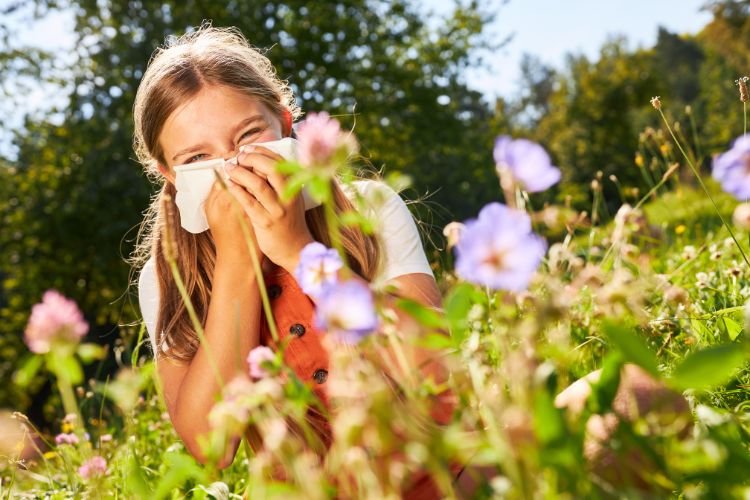As the vibrant colors of spring emerge and nature awakens, so do seasonal allergies for many individuals. Spring allergies, also known as hay fever or allergic rhinitis, can dampen the joy of the season with symptoms such as sneezing, itchy eyes, nasal congestion, and fatigue. However, understanding the underlying mechanisms of allergies and adopting a holistic approach to managing them can significantly alleviate symptoms and enhance overall well-being.
Understanding Spring Allergies
Allergies, whether inherited or acquired, are a manifestation of an overactive immune system. While genetics play a role in predisposing individuals to allergies, environmental factors also contribute to their development. When the immune system perceives harmless substances such as pollen, dust mites, or pet dander as threats, it initiates an exaggerated response, triggering the release of histamine and other inflammatory substances. This immune overreaction leads to the uncomfortable symptoms experienced during allergy season.
Calming the Immune System
Reducing allergy symptoms begins with calming the immune system and addressing underlying factors contributing to its hyperactivity. One crucial step is minimizing histamine levels in the body, as histamine is a key mediator of allergy symptoms. Incorporating histamine-reducing foods such as fresh fruits and vegetables, organic or grass-fed proteins, and omega-3 fatty acids can help mitigate allergic reactions.
Moreover, strengthening the immune system’s defenses through probiotics can enhance its ability to distinguish between harmless and harmful substances, thereby reducing the likelihood of exaggerated responses to allergens. Foods rich in probiotics, such as yogurt, kefir, sauerkraut, and kimchi, promote a healthy balance of gut bacteria, which is essential for immune function
Three Steps to Reduce Allergy Symptoms
Step 1: Adopt a Nutrient-Dense Diet
A nutrient-dense diet provides essential vitamins, minerals, and antioxidants necessary for optimal immune function and overall health.
- Incorporate a variety of colorful fruits and vegetables, to maximize vitamins and minerals that support the immune system.
- Consume wild caught or grass-fed proteins, and healthy fats into your meals to support your body’s natural defenses and produce healthy immune cells.
- Make sure to include plenty of omega 3 rich foods such salmon, grass-fed meats, walnuts, flax, pumpkin seeds, and chia seeds. Omega 3 fats reduce the inflammatory factor that can be exaggerated when having an allergic response.
- Eat foods rich in vitamin C, vitamin E, and quercetin which possess anti-inflammatory properties and can help alleviate allergy symptoms.
- Eat foods rich in zinc to support healthy immune function including shell fish, beef, pork, cashews and oats.
- Include immune-boosting foods such as garlic, ginger, turmeric, citrus fruits, nuts, seeds, and spinach in your diet. These foods contain compounds that enhance immune function and reduce inflammation, making them valuable allies during allergy season.
Step 2: Strengthen Immune System Defenses
Remove any known stressors to your immune system. Avoid all foods that you are allergic or have a food sensitivity to. Avoid toxic chemicals and household cleaners. Clean house of mold toxins and dust to the best of your ability. Any stressor imposed on the immune system can weaken the system leaving it less able to fight allergens that are out of your control like pollen. Boosting your immune system’s defenses is paramount in reducing the severity of allergy symptoms.
Step 3: Address True Allergies and Food Sensitivities
Identifying and addressing true allergies and food sensitivities is crucial for alleviating allergy symptoms and reducing the strain on the immune system. Both allergies and sensitivities can trigger immune responses that compromise the body’s ability to fight off foreign invaders effectively. Consult with a healthcare professional to determine any underlying sensitivities or allergies and develop a personalized plan to manage them effectively.
Managing spring allergies requires a comprehensive approach that addresses the underlying causes of immune dysfunction while supporting overall health and well-being. By adopting a nutrient-dense diet, strengthening immune system defenses, and addressing true allergies and sensitivities, individuals can experience significant relief from seasonal allergy symptoms and enjoy the beauty of spring to the fullest.
Bonus Tip: Harness the Power of Local Raw Honey
In addition to adopting a nutrient-dense diet and strengthening immune defenses, incorporating local raw honey into your daily routine can offer a natural remedy for combating seasonal allergies. Consuming raw honey sourced from your local area exposes your body to small amounts of pollen from nearby plants. Over time, this exposure can desensitize your immune system to local pollens, reducing the severity of allergic reactions.
Local raw honey contains trace amounts of pollen spores, enzymes, and other beneficial compounds that support immune function and alleviate allergy symptoms. By regularly consuming small doses of local pollen through raw honey, you can help train your immune system to recognize and tolerate these allergens more effectively.
To reap the benefits of local raw honey, aim to consume a teaspoon or two daily, either on its own, mixed into warm water or herbal tea, or drizzled over yogurt or oatmeal. Be sure to choose honey labeled as “raw” and sourced from beekeepers in your area to ensure maximum potency and effectiveness.
While raw honey may not provide immediate relief from allergy symptoms, incorporating it into your daily routine as a natural immune booster can complement other allergy management strategies and contribute to long-term allergy resilience.
By harnessing the power of local raw honey alongside other holistic approaches, you can empower your body to better tolerate seasonal pollens and enjoy a more comfortable and symptom-free spring season.



